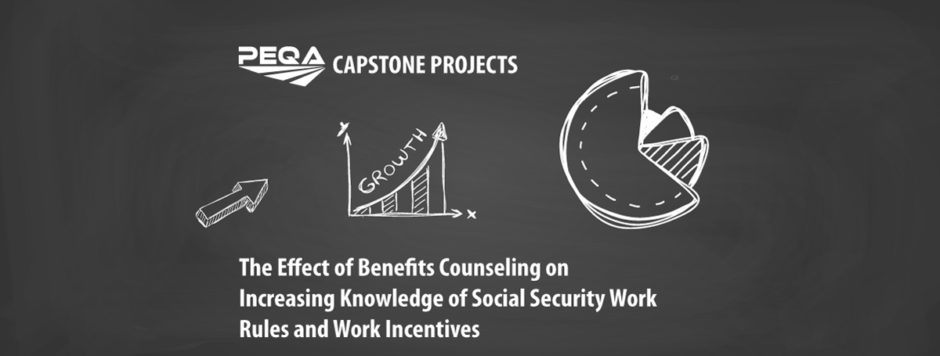Takeaways for VR Counselors & Administrators
Background
VR customers receiving SSI/SSDI may lack motivation to obtain and maintain employment due to the negative effect on benefits. A customer’s ability to obtain/maintain employment may be impacted by a lack of knowledge about natural supports and access to community resources.
Michigan Rehabilitation Services (MRS) began a pilot with three local offices and three Disability Networks/Centers for Independent Living (CIL) to provide comprehensive benefits planning services to MRS customers. Benefits Counseling have been provided by trained Community Partner Work Incentives Coordinators (CPWICs) to improve long term employment outcomes for SSI/SSDI recipients and to increase participant knowledge of Social Security and other community resources. The purpose of this study is to evaluate the pilot project.
Purpose of the Study
The purpose of the study was to evaluate the effectiveness of benefits counseling provided to MRS customers who receive Social Security benefits. The research questions included:
- What are the specific best practices in delivering benefits counseling to customers?
- Does benefits counseling improve a customer’s knowledge of Social Security work rules?
- Does benefits counseling improve a customer’s knowledge of work incentives?
Methods
To evaluate the effectiveness of the pilot project, the following procedures were made:
- Reviewed BP related studies
- Developed evaluation procedures and pre- and post-test questions (in collaboration with CIL administrators)
- Provided a series of training sessions about data collection to CIL staff (CWICs)
- Collected the pre- and post-tests (by Feb 29, 2020)
- Analyzed the data
Participants: A total of 82 Social Security recipients participated in the study from July 1, 2019 through February 29, 2020. As shown below, 24 participants received Supplemental Security Income (SSI) only, 40 participants received Social Security Disability Income (SSDI) only and 18 participants received both SSI and SSDI.
Pre- and Post-test: New data was collected by providing customers a pre- and post-test. The test instrument consists of three sections: basic individual characteristics (e.g., SSI/DI status, work status), knowledge about Social Security rules, and level of knowledge and intention to use work incentives/benefits.
Results
The best practices in delivering benefits counseling is to ensure services are delivered by trained staff. All staff delivering service were trained Community Work Incentives Coordinators. This ensured consistency of services and quality of delivered services over several project sites.
In relation to increasing knowledge of Social Security work rules, after receiving benefits counseling, 75% of individuals receiving SSI only answered all 5 questions correctly, 12.5% answered 4 questions correctly, 8.3% answered 3 correctly while only 1 participant answered 1 question correctly. While 66.7% of SSDI participants answered 5 questions correctly, 20.5% answered 4 questions, 10.3% answered 3 questions correctly and 2.6% Of the individuals who received both SSI and SSDI, 55.6% of participants answered all 6 questions correctly, 11.1% answered 5 questions correctly, 22.2% answered 4 correctly and 11.1% of participants answered 3 questions correctly.
This shows that individuals only receiving SSI had a better general knowledge of the Social Security work rules after delivery of benefit counseling followed by SSDI only and then individuals who received both SSI and SSDI.
All work incentive knowledge increased after delivery of benefits counseling except for knowledge of Plan to Achieve Self-Support (PASS) and Subsidy Housing (Section 8). For example: Prior to benefits counseling, 43% knew a lot or somewhat about Ticket to Work while 46% did not know about Ticket to Work. After benefits counseling, 84% of all recipients reported knowing a lot about or knew somewhat about Ticket to Work and 5% reported not at all.
The intention to use work incentives varied with the most likely used incentive would be Ticket to Work with 63% stating they would use the incentive followed by, Expedited Reinstatement 48% and then Trial Work Period 41%. The three least likely used incentives include MiCap at 7%, PASS at 6% and Unincurred Business expense being the lowest at 4%.
Both knowledge of work rules and work incentives increased overall, after receiving benefits counseling. Beneficiaries having this knowledge will allow them to make educated decisions about working. Although this was a short-term study measuring knowledge gain, the long-term study will examine work intentions and employment outcomes for beneficiaries who received benefits counseling.
Implication for Practice or Future Research
The results of the evaluation will be used to improve service delivery to customers who receive Social Security benefits. It will also be used to determine if protocols of the pilot are effective and should be expanded MRS customers statewide. Further investigation on employment outcomes is needed.
Resources
- Capstone Project Summary (PDF)
- Capstone Project Poster: WORD | Powerpoint
Capstone projects
More Capstone Projects: Capstone Project Hub.

